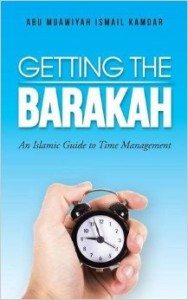Q&A About Getting The Barakah Time Management eBook
The following questions were asked to Shaykh Ismail Kamdar, author of Getting The Barakah and founder of Islamic Self Help.
Q: How do you deal with writer’s block?
A: I set a daily time for writing (1 Hour) and force myself to write during that time whether I am in the mood to write or not. If I have writer’s block on a specific topic, I write about something else.
Alternatively, I make a mind-map about the topic and it helps stimulate my thoughts and generate more content to write about.
Q: What’s the best thing about being a writer?
A: The best part about being an author is being able to do what I love most (writing) in a way that benefits people. Anytime love for something meets benefit for society, you have a Win/Win situation, and that is what writing is for me, I win by doing what I love and the readers win by getting something interesting to read.
Q: What’s your advice for aspiring writers?
A: Have a clear goal and vision, know why you are writing and what you hope to accomplish through writing and make sure everything you write is working towards that goal.
For me the goal is simple: to make this world a better place than I found it, and I believe inspirational writings go a long way towards reforming the world.
If you are serious about writing a book, then hold yourself responsible to do so. Make time daily to write, set clear deadlines and stick to them. It is very easy to get distracted by the internet and many other things, so having clear goals, dedicated time and a set deadline keeps us on track.
Q: What are you currently working on?
A: I have a book on Self-Confidence coming out in July 2015, inshaa Allah.
After that, I am working on two more Self-help books, a couple of fictional novels and a long series of Islamic books. I hope to publish at least 10 more books over the next four years, inshaa Allah.
Q: How do you get inspired to write?
A: Anytime I find a problem in society, my mind races to find solutions. Those solutions form the basis for any book or article I write.
In short, people’s problems are my inspirations since I want to help solve them.
Q: Where did you get the title for your latest book “Getting The Barakah” from?
A: I was struggling to come up with a decent title for the book for a long time. I tried brainstorming, mind-mapping, writing anything that comes to mind, but nothing really good came to my mind. Then one morning, Alhamdulillah, while exercising the title literally popped into my head and I ran back to my PC, wrote it down and realized that’s the title I was looking for!
Q: Why write a book on time management when there are so many other issues that Muslims need to talk about?
A: Islam teaches us to value time and make the best usage of our time. Yet, many Muslims are late for everything and rushing around complaining that they don’t have time to get things done. This book was written to help people make time for what is important including Salah and reciting Qur’an and to utilize their time productively. This is something that I believe every Muslim can benefit from in both worlds.
If you have any questions regarding the book, ask below in the comments section.
Getting The Barakah is currently available for purchase here.






